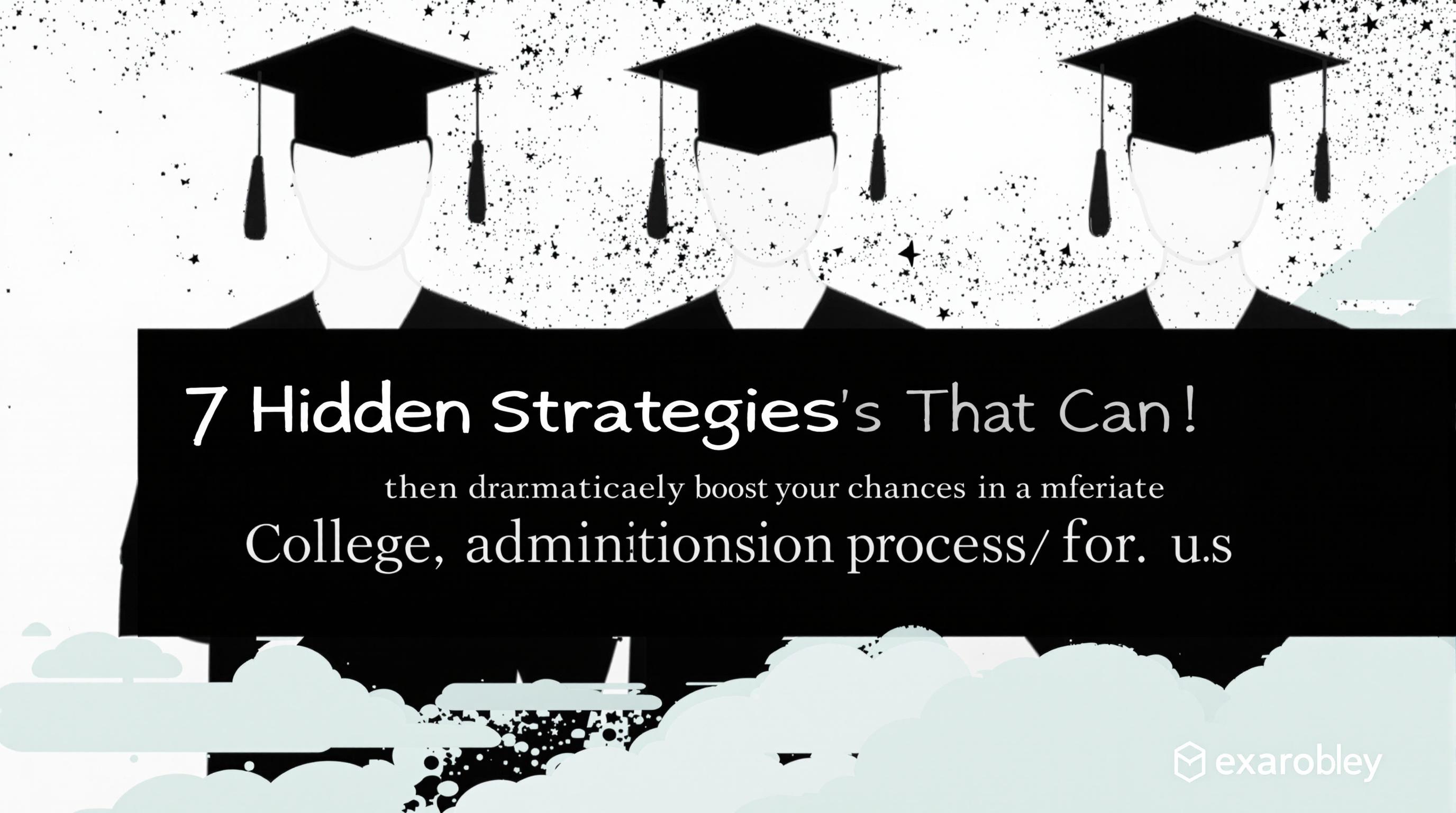Featured Articles
- 10 Unseen Factors That Could Transform Your College Admissions Experience in 2024
- 11 Surprising Trends in College Admissions: How Cryptocurrencies Could Influence Your Acceptance in 2024
- 7 Hidden Strategies That Can Dramatically Boost Your Chances in the College Admissions Process Today
- Beyond Grades: How Video Game Skills and Esports Experience Influence College Admissions in 2024
- "Beyond Test Scores: The Rise of Emotional Intelligence in College Admissions Decisions"
"Beyond Test Scores: The Rise of Emotional Intelligence in College Admissions Decisions"
"Beyond Test Scores: The Rise of Emotional Intelligence in College Admissions Decisions"
The landscape of college admissions is rapidly evolving, with emotional intelligence (EI) emerging as a significant factor alongside traditional metrics like test scores. This shift signifies a broader understanding of what it means to succeed in academia and beyond—focusing not just on intelligence quotient (IQ) but on the ability to manage emotions, empathize with others, and navigate social complexities.
Why Emotional Intelligence Matters
As an 18-year-old who's just dived into the world of college applications, I can tell you firsthand that the pressure for perfection can make anyone question their worth. We live in an era where standardized testing scores reign supreme in the admissions process, often overshadowing traits that can't be quantified by numbers alone. A study from the Consortium for Research on Emotional Intelligence in Organizations found that emotional intelligence accounts for approximately 58% of performance in all types of jobs. This suggests a high correlation between emotional aptitude and overall success—an insight that is beginning to permeate college admissions.
Colleges Taking Notice
More universities are recognizing the importance of emotional intelligence and character traits in their prospective students. A 2023 survey conducted by the American Association of Colleges and Universities revealed that 76% of institutions believe that emotional intelligence is as important as academic performance in shaping a well-rounded student. Institutions like the University of California system and Wake Forest University are already prioritizing holistic admissions processes that evaluate applicants on their personal characteristics, including resilience, motivation, and social awareness.
Beyond Standardized Tests: The Holistic Approach
In the sweeping sea of college admissions, navigating through a multitude of applications can feel like an endless cycle of numbers and statistics. But many prestigious colleges are adopting a holistic approach to admissions, aiming to build diverse and dynamic student bodies. For instance, the University of Chicago announced in 2018 that it was test-optional—a landmark moment in academia that encouraged students to showcase their unique narratives without being boxed in by scores.
By looking beyond test scores, colleges not only cultivate an academically strong class but also one that is rich in diverse experiences and backgrounds. For instance, Wake Forest's highly publicized shift toward a holistic review process has been underscored by their interest in personal essays and letters of recommendation, which often serve as a window into the emotional intelligence of an applicant.
The Science Behind Emotional Intelligence
Emotional intelligence is broadly categorized into five key components: self-awareness, self-regulation, motivation, empathy, and social skills. According to psychologist Daniel Goleman, who popularized the concept, these attributes can be as crucial to success as traditional cognitive skills. In fact, research from the Center for Creative Leadership demonstrates that strong EI skills can help individuals manage stress, create better team dynamics, and navigate workplace challenges, making them invaluable in both academic and professional environments.
Additionally, high EI is linked to better leadership outcomes. A review of 72 studies conducted by the Journal of Organizational Behavior found that leaders with high emotional intelligence contributed positively to team performance. In this context, colleges are beginning to seek future leaders who can inspire and empathize—a fresh take on the qualities that herald success.
Winning at the Admissions Game
So how can students enhance their emotional intelligence in a way that will bolster their college applications? Here are a few tips that can help students showcase their EI on application materials:
- Engage in Self-Reflection: Taking time to reflect on personal experiences and emotions can help students articulate their journey effectively in essays and interviews.
- Demonstrate Empathy: Involve yourself in volunteer work or organizations that promote community. This enhances emotional understanding and illustrates commitment to the welfare of others.
- Showcase Collaborative Skills: Participate in team sports, clubs, or group projects that require negotiation and teamwork, highlighting these experiences in applications.
The Rising Influence of Emotional Quotient
Isn’t it amusing how the focus has now shifted from simply memorizing statistics to understanding our feelings? Think back to the days when the only EI we cared about was the emotional intelligence of our favorite rom-com characters. Now, we could be harnessing our own on college applications!
Take a page from the life of Sarah Thompson, a high school senior who struggled with standardized tests but excelled in teamwork and communication. Her application emphasized her role as captain of the debate team and volunteer leader at the local homeless shelter. Although her SAT scores were average, her compelling narrative of resilience and empathy helped her secure a spot at a top university. her story exemplifies how emotional intelligence can indeed tip the scales in favor of applicants with diverse strengths.
Bridging the Gap: Emotional Intelligence in the Classroom
The rise of emotional intelligence is not limited to just college admissions; it's seeped into educational curriculum reforms across the country. Schools are increasingly embedding social-emotional learning (SEL) into their programs, equipping students with the skills to manage emotions, set positive goals, and show empathy. According to a meta-analysis published in the journal "Child Development," investing in SEL programs can lead students to become more engaged, achieve better academic results, and have improved social interactions.
As these programs flourish, they reduce dropout rates and foster environments that encourage emotional growth, thus directly influencing the pool of prospective college students. It's a win-win situation—students are not only becoming more emotionally intelligent but also emerging as well-rounded individuals who are prepared for the challenges of higher education.
Challenges Ahead
Yet, as we move toward a future where colleges are increasingly focused on emotional intelligence, there are challenges to consider. Some critics argue that it might be impossible to measure emotional intelligence reliably during the admissions process. While essays and interviews can provide insight, they are inherently subjective. The concern remains: Are we inadvertently turning emotional intelligence into a checkbox item rather than genuinely valuing it?
Moreover, the emphasis on holistic admissions can create new inequalities. The pressure to demonstrate emotional intelligence through unique experiences may disadvantage students who may not have access to diverse opportunities for growth, particularly those from under-resourced backgrounds. As colleges strive for emotional awareness, they still have to balance fairness and inclusivity in the admissions game.
The Future of College Admissions
It’s fascinating to think about how today’s high school students will shape the future of our universities. As emotional intelligence gains a foothold in college admissions, generations of young adults will enter higher education not just equipped with academic achievements but also the emotional resilience to navigate their experiences. Imagine a classroom teeming with empathy, collaboration, and understanding—these are the environments that emotional intelligence can foster.
As more institutions shift their admission criteria, it’s clear that emotional intelligence is here to stay. College advisors and educators should encourage students to explore their emotional landscapes and nurture these skills. After all, in a world where the most innovative solutions often stem from interpersonal connection, the admission of heart can be just as crucial as the admission of mind.
Your Own Journey
In conclusion, as you embark on the journey of college applications, remember that your emotional intelligence is an asset worth celebrating. While test scores can give a glimpse of your academic capabilities, it's the stories of resilience, empathy, and your social journey that will truly resonate with admissions committees. So, build those connections, enhance your emotional skills, and let your true self shine through your application! Good luck!




